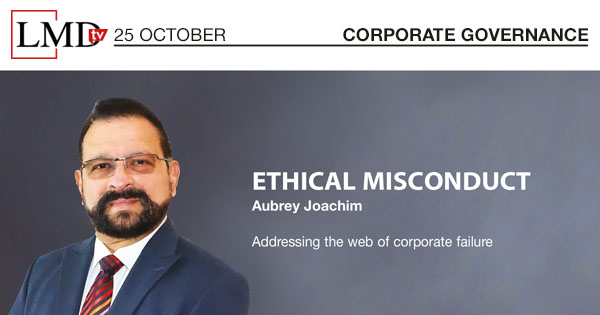
The term ‘corporate governance’ has existed for years but its meaning continues to evolve with the times. According to founder and owner of Leading Edge Change, and past Global President of the Chartered Institute of Management Accountants (CIMA) Aubrey Joachim, corporate governance is “not only a remit of the business world but also the public domain.”
“Governments are the highest level corporation in any country so governance involves the government or executive, the judiciary, public administration, various government agencies and the general public,” he said, on LMDtv.
Joachim also explained corporate governance from an organisational perspective: “Corporate governance is the way that organisations are managed at the highest levels. It involves a set of relationships between a company’s management, board, shareholders and all other stakeholders that engage with it.”
“It also provides a structure through which the objectives of the company, and means of achieving and monitoring them, are set,” he added.
When it comes to corporate governance in Sri Lanka, Joachim observed that “there seems to be a failure of corporate governance in a number of areas across the public and private sectors” with widespread, systemic and severe governance weaknesses and corruption vulnerabilities.
“There is a correlation between how an organisation or even a country performs economically and its governance,” he explained, adding: “So it would also mean that such a culture of poor governance has permeated the private sector as it’s a correspondent interfacing on a number of engagements and transactions with the public sector, and is somehow caught up in this web of corporate failure.”
“The corporate governance culture of any organisation takes its cue from the overarching governance culture and environment it operates in. In Sri Lanka therefore, the overall picture looks bleak whether you look at it from the perspective of the public or private sector,” Joachim asserted.
He outlined several challenges for Sri Lanka in pursuing corporate governance including corruption, and issues surrounding accountability, transparency, effectiveness, efficiency and strategic vision.
Joachim, who is based in Australia, also commented on the prevailing culture of ethical misconduct in Sri Lanka, which he said comes from a “long process of moral decay that permeates across families, society, organisations and ultimately, the nation.”
“The ethical and moral conscience is blunted – the distinction between right and wrong is blurred; and increasingly, the deviation from the straight and narrow path widens,” he stressed.
And he emphasised: “Ethical misconduct in the case of Sri Lanka is deep-rooted. It stems from behaviours, values and ethics that are ingrained into the minds of [people] from a very young age.”
Leading Edge Change’s Founder and Owner cited common examples of how ethical misconduct begins in the family unit: “Parents bribe teachers under the guise of giving gifts to gain favour towards their children. A father caught breaking road rules will not think twice about offering a bribe to a policeman in the presence of his children in the car.”
“Eradication of ethical misconduct must start at the grassroots level – but unfortunately, the solution in Sri Lanka seems generations away,” Joachim lamented.
The past Global President of CIMA recommended that the nation addresses ethical misconduct through a mindset change, which “is the foundation of system change.”
He noted: “Civic-mindedness should reside high on corporate agendas and therefore, be pursued by directors and managers of organisations.”
“Ethical misconduct is very difficult to eradicate. But a start must be made somewhere,” Joachim urged, concluding with the thought that “at least the next generation should be immunised from the rest of what has been happening and steps taken to move forward from that point.”

